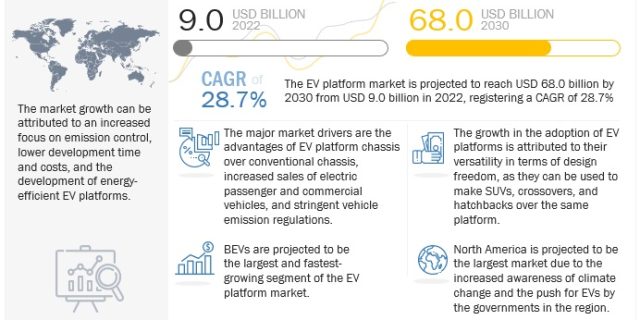
The EV platform market is estimated to grow from USD 9.0 billion in 2022 to USD 68.0 billion by 2030 at a CAGR of 28.7% over the forecast period.
Preference for high-voltage and long-distance range EVs , high demand for solid-state batteries in EVs, growing demand for end-to-end software-defined vehicles , and development of lightweight EVs would create growth opportunities in the EV platform industry.
BYD, Hon Hai Precision Industry Co., Ltd., Toyota, Nidec Corporation, Hyundai Motor Group, and Mahindra and Mahindra are major players in China, Japan, and South Korea. In December 2022, Toyota announced that it plans to roll out 30 battery EV models by 2030, globally offering a full lineup of battery EVs in the passenger and commercial segments. Hence, it will be working on dedicated EV platforms to cater to this need. Top Japanese OEMs also plan to gradually stop manufacturing petrol vehicles by 2035 and shift to PHEVs and FCEVs. In recent years, Toyota has invested in electric vehicle (EV) technology and developed both EV and modular EV platforms and hybrid and fuel-cell vehicles. The company also has been investing in self-driving technology. It has announced a partnership with the Chinese technology giant CATL to develop solid-state batteries for electric vehicles, considered the next generation of batteries. Toyota is partnering with Suzuki Motor Corporation, Daihatsu Motor Co., and Commercial Japan Partnership Technologies (CJPT) to build mini commercial electric vans. Suzuki and Daihatsu will bring their knowledge of manufacturing mini vehicles to the table, while Toyota will come forth with its electrification technology to jointly develop the BEV system. Various top European and American OEMs also cater to the Asia Pacific EV platform market on an increasing scale. All these factors are expected to drive the EV Platform market in the Asia Pacific region.
Asia Pacific has the presence of many major EV platform manufacturers, such as BYD Company Ltd., Hyundai Motor Group, Toyota, Mahindra and Mahindra, Nidec Corporation, and Hon Hai Precision Industry Co., Ltd.
Download PDF Brochure: https://www.marketsandmarkets.com/pdfdownloadNew.asp?id=127463561
The steering system is expected to register the largest growth during the forecast period.
Electric steering systems are becoming more common in modern EVs due to their improved energy efficiency and reduced maintenance requirements. Electric steering systems are more energy efficient than hydraulic steering systems since they do not require a pump to generate hydraulic pressure. This can help to extend the range of an EV. By developing precise and responsive steering systems, researchers and automakers hope to reduce the risk of accidents and improve the overall safety of EVs. Another goal of steering system advancements in EVs is to improve the driving experience for EV drivers. This includes developing systems that provide better feedback and communication to the driver and systems that are more responsive and easier to use. The companies are adopting steer-by-wire technology to reduce the vehicle’s mechanical linkages and the weight of electric vehicles. For instance, REE automotive P7 EV chassis is built on four REEcorners featuring REE automotive x-by-wire technology. REEcorners pack critical vehicle components into the area between the Chassis and the wheel, enabling a fully flat chassis end-to-end with up to 35% more interior volume for passengers, cargo, and batteries. Electric vehicles built on the P7 Chassis have some of the lowest step-in heights, are autonomous-ready, and can be powered by batteries or fuel cells. The demand for EV platforms and an increase in safety regulations are expected to increase the demand for steering systems during the forecast period.
The Asia-Pacific will be the largest EV platform market during the forecast period.
Countries like China, Japan and South Korea will lead the Asia-Pacific EV platform market. The governments of these countries have supported the growth of EV demand through subsidies and favorable policies for EVs by discouraging the use of gasoline/diesel vehicles. This has led to a fast-growing demand for EVs in the region, making it the most attractive market for EV platform manufacturers.
Asia-Pacific is a price-sensitive market, and hatchback and SUVs/MPVs types of electric passenger cars are mostly sold in the region. Of the region’s total electric passenger car sales, ~65% were SUVs, hatchbacks, etc. Hence, an EV platform is an option that can help manufacturers meet the rising demand for EVs but would also help to increase the range of these EVs without much rise in the cost.
Request Sample Report: https://www.marketsandmarkets.com/requestsampleNew.asp?id=127463561
Utility vehicles (SUVs/MPVs) would hold the largest market share.
The utility vehicles (SUVs/MPVs) segment is globally leading the EV platform market. The utility vehicles segment is expected to see greater adoption by companies due to greater public demand and sales. In recent years, SUVs have become popular as family vehicles due to their spacious interiors, safety features, and versatility. Considering the same, the EV platform manufacturers have also focused on making SUV-based platforms and diversifying it to other types. For example, Rivian Automotive Inc. (US) launched its R1S EV SUV based on its in-house developed platform in 2022.
Similarly, Zero Labs Automotive (US) made an EV platform for modifying classical SUVs such as Ford Bronco or Land rover defender. Again, in 2022, Canoo (US) gave the US Army a light tactical utility vehicle based on its EV platform. Furthermore, in 2022, Mahindra and Mahindra (India) showcased its upcoming electric SUVs – XUV-300 – re-badged as XUV-400. In 2022, Toyota (Japan) showcased a huge variety of EVs for its future, many of which were in the SUV segment based on a new platform being developed by Toyota. Hyundai and Kia also launched their Ioniq 5 and EV-6 crossover SUVs in 2022 across the globe, and both were based on Hyundai’s E-GMP platform. Of the global electric passenger car sales, ~64% were electric SUVs/MPVs in 2022. Considering the same, the electric utility segment would be the most attractive for EV platform manufacturers.
Key Market Players
The key players in the automotive EV Platform market are Volkswagen Group (Germany), BYD Company Ltd. (China), Hyundai Motor Group (South Korea), Renault (France), and Ford (US).
Related Reports:
EV Battery Market – Global Forecast to 2027
Electric Vehicle Market – Global Forecast 2030
Electric Trucks Market – Global Forecast to 2030
